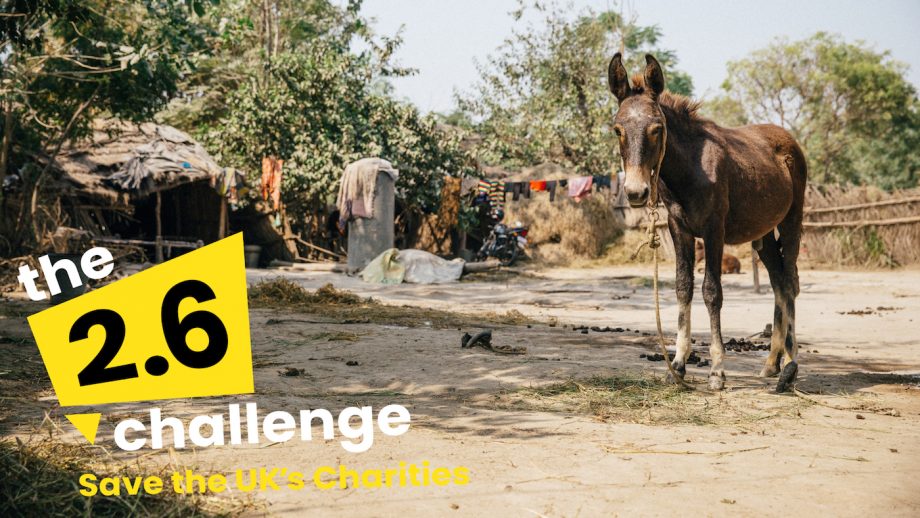As we await the government’s plans to start lifting the lockdown measures, H&H highlights just some of the inspirational individuals and businesses that have been using creative thinking to make the most of this difficult period...
The equestrian community has adapted to lockdown restrictions with “out of the box” thinking, shining a positive light during challenging times.
With the help of technology and creative thinking, some businesses and individuals have been able to keep operating through the coronavirus pandemic, while supporting each other.
Patrick Pollock, director of the equine hospital and practice at the Royal (Dick) School of Veterinary Studies, told H&H that despite restrictions and reduced staff, this has been the hospital’s “finest hour”.
{"content":"PHA+4oCcV2XigJlyZSB3b3JraW5nIGhhcmQgdG8gbWFrZSBzdXJlIHdlIHVzZSB0aGUgbWluaW11bSBvZiBldmVyeXRoaW5nLiBXZeKAmXZlIGhhZCBtZWRpY3MgcmluZyB1cyB0byBzYXkgdGhleSBjYW7igJl0IGdldCBhIGNlcnRhaW4gZHJ1ZyBvciBjb25zdW1hYmxlIGFuZCB3ZeKAmXZlIGJlZW4gYWJsZSB0byBzb3VyY2UgaXQgZm9yIHRoZW0gdGhyb3VnaCBvdXIgdmV0ZXJpbmFyeSBzdXBwbHkgY2hhaW4s4oCdIGhlIHNhaWQuPC9wPgo8cD7igJxXZeKAmXZlIGdpdmVuIGF3YXkgYSBsb3Qgb3VyIGdvd25zLCBtYXNrcyBhbmQgdmVudGlsYXRvcnMgdG8gbG9jYWwgTkhTIGhvc3BpdGFscywgYnV0IHRoZXJl4oCZcyBhIHJlYWwg4oCYc3Bpcml0IG9mIHRoZSBCbGl0euKAmSBjYW1hcmFkZXJpZSBhbmQgd2XigJlyZSBhbGwgd29ya2luZyB0b2dldGhlci4gQW5pbWFsIHdlbGZhcmUgaGFzIGJlZW4gYXQgdGhlIGZvcmVmcm9udCBvZiBldmVyeXRoaW5nIOKAkyBhcyB3ZWxsIGFzIGh1bWFuIHdlbGZhcmUu4oCdPC9wPgo8cD48ZGl2IGNsYXNzPSJhZC1jb250YWluZXIgYWQtY29udGFpbmVyLS1tb2JpbGUiPjxkaXYgaWQ9InBvc3QtaW5saW5lLTIiIGNsYXNzPSJpcGMtYWR2ZXJ0Ij48L2Rpdj48L2Rpdj48c2VjdGlvbiBpZD0iZW1iZWRfY29kZS0zMSIgY2xhc3M9ImhpZGRlbi1tZCBoaWRkZW4tbGcgcy1jb250YWluZXIgc3RpY2t5LWFuY2hvciBoaWRlLXdpZGdldC10aXRsZSB3aWRnZXRfZW1iZWRfY29kZSBwcmVtaXVtX2lubGluZV8yIj48c2VjdGlvbiBjbGFzcz0icy1jb250YWluZXIgbGlzdGluZy0tc2luZ2xlIGxpc3RpbmctLXNpbmdsZS1zaGFyZXRocm91Z2ggaW1hZ2UtYXNwZWN0LWxhbmRzY2FwZSBkZWZhdWx0IHNoYXJldGhyb3VnaC1hZCBzaGFyZXRocm91Z2gtYWQtaGlkZGVuIj4NCiAgPGRpdiBjbGFzcz0icy1jb250YWluZXJfX2lubmVyIj4NCiAgICA8dWw+DQogICAgICA8bGkgaWQ9Im5hdGl2ZS1jb250ZW50LW1vYmlsZSIgY2xhc3M9Imxpc3RpbmctaXRlbSI+DQogICAgICA8L2xpPg0KICAgIDwvdWw+DQogIDwvZGl2Pg0KPC9zZWN0aW9uPjwvc2VjdGlvbj48L3A+CjxwPk1yIFBvbGxvY2sgc2FpZCB3aGVuIGEgaG9yc2UgYXJyaXZlcyBhdCB0aGUgaG9zcGl0YWwgZm9yIHRyZWF0bWVudCBpdCBpcyB1bmxvYWRlZCBpbnRvIGEgc3RhYmxlIGFuZCB0aGVyZSBpcyBubyBkaXJlY3QgY29udGFjdCB3aXRoIG93bmVyczsgYWxsIGNvbW11bmljYXRpb24gdGFrZXMgcGxhY2UgZWxlY3Ryb25pY2FsbHkuPC9wPgo8cD7igJxXZeKAmXZlIGJlZW4gYWJsZSB0byBzdXBwb3J0IHZldHMgYW5kIGNsaWVudHMgdXNpbmcgb3VyIHRlbGVtZWRpY2luZSBwbGF0Zm9ybSBzbyB3ZSBjYW4gZG8gYSBsaXZlIGNvbnN1bHQgYW5kIG1ha2UgdGhlIGRlY2lzaW9uIG9uIHdoZXRoZXIgYSBob3JzZSBuZWVkcyB0byBjb21lIGluLiBXZeKAmXJlIGFsc28gcHJvdmlkaW5nIGEgdGVsZW1lZGljaW5lIHNlcnZpY2UgdG8gb3duZXJzIGluIHRoZSBIaWdobGFuZHMgYW5kIElzbGFuZHMgb2YgU2NvdGxhbmQs4oCdIGhlIHNhaWQuPC9wPgo8cD7igJxJIGhvcGUgc29tZSBwb3NpdGl2ZXMgY2FuIGNvbWUgYXQgdGhlIGVuZCBvZiB0aGlzLCB3aGljaCBtaWdodCBiZSB0aGF0IHdlIHdpbGwgaGF2ZSBkZXZlbG9wZWQgdGhlc2UgcGxhdGZvcm1zIGFjcm9zcyB0aGUgVUsgc28gbm8gb25lIGdvZXMgd2l0aG91dCB0aGF0IGxldmVsIG9mIHZldGVyaW5hcnkgc3VwcG9ydDsgeW91IHNob3VsZCBnZXQgdGhlIHNhbWUgbGV2ZWwgb2Ygc3BlY2lhbGlzdCBzdXBwb3J0IHdoZXRoZXIgeW914oCZcmUgb24gdGhlIElzbGUgb2YgTGV3aXMgb3IgaW4gQmFzaW5nc3Rva2UuIEkgdGhpbmsgd2XigJlsbCBnZXQgdGhlcmUgYmVjYXVzZSBwZW9wbGUgd2lsbCBiZSBtb3JlIGVudGh1c2lhc3RpYyBhYm91dCB1c2luZyB0ZWNobm9sb2d5LuKAnTwvcD4KPGRpdiBjbGFzcz0iYWQtY29udGFpbmVyIGFkLWNvbnRhaW5lci0tbW9iaWxlIj48ZGl2IGlkPSJwb3N0LWlubGluZS0zIiBjbGFzcz0iaXBjLWFkdmVydCI+PC9kaXY+PC9kaXY+CjxwPkJyaXRpc2ggU2hvd2p1bXBpbmcgYWNjcmVkaXRlZCBjb2FjaCBFcm5lc3QgRGlsbG9uLCB3aG8gaGFzIGNyZWF0ZWQgc2V2ZW4gdHJhaW5pbmcgdmlkZW9zIGZvciBzYWxlLCBpbmNsdWRpbmcgcG9sZXdvcmsgYW5kIGV4ZXJjaXNlcyBmb3IgaW1wcm92aW5nIGNhbnRlciwgdG9sZCA8ZW0+SCZhbXA7SDwvZW0+IGxvY2tkb3duIHJlc3RyaWN0aW9ucyBoYWQgYmVlbiDigJxpbmNyZWRpYmx5IGRpZmZpY3VsdOKAneKAkyBidXQgc2FpZCB0aGUgZXF1ZXN0cmlhbiBjb21tdW5pdHkgaXMgYWRhcHRpbmcg4oCcbGlrZSBpdCBhbHdheXMgZG9lc+KAnS48L3A+CjxwPuKAnEkgY2Fu4oCZdCBnZXQgdG8gbXkgY2xpZW50cyB0aGUgd2F5IEkgc2hvdWxkIGJlIGFibGUgdG8sIHNvIHRoZXkgbmVlZCBzb21ldGhpbmcgZWxzZSzigJ0gaGUgc2FpZC4g4oCcSeKAmW0gYWxzbyBkb2luZyBab29tIGxlc3NvbnMsIHdpdGggY2xpZW50cyBhcyBmYXIgYXdheSBhcyB0aGUgVVMgaGF2aW5nIHdlZWtseSBsZXNzb25zLjwvcD4KPGRpdiBjbGFzcz0iYWQtY29udGFpbmVyIGFkLWNvbnRhaW5lci0tbW9iaWxlIj48ZGl2IGlkPSJwb3N0LWlubGluZS00IiBjbGFzcz0iaXBjLWFkdmVydCI+PC9kaXY+PC9kaXY+CjxwPuKAnEhvcnNlIHBlb3BsZSBhcmUgYSB0b3VnaCBidW5jaCwgYW5kIGlmIGFueW9uZSBpcyBnb2luZyB0byBtYWtlIGl0IHRocm91Z2ggdGhpcywgaXQgd2lsbCBiZSBob3JzZSBwZW9wbGUu4oCdPC9wPgo8cD5BYmVyZGVlbiBSaWRpbmcgQ2x1YiBoYXMgc2V0IHVwIGFuIGVxdWluZSBwcm9mZXNzaW9uYWwgc3VwcG9ydCBncm91cCB1c2luZyB2aWRlbyBjb25mZXJlbmNpbmcuIFRoZSBncm91cCBjb21wcmlzZXMgcGh5c2lvdGhlcmFwaXN0cywgY29hY2hlcywgY2VudHJlIHByb3ByaWV0b3JzLCBmYXJyaWVycyBhbmQgdmV0cywgYW5kIGVhY2ggd2VlayBob2xkcyBvbmxpbmUgc2Vzc2lvbnMgdG8gYWlkIHdpdGggcHJvZmVzc2lvbmFsIGRldmVsb3BtZW50IHdpdGggc29tZW9uZSBmcm9tIGEgZGlmZmVyZW50IG9jY3VwYXRpb24gcHJlc2VudGluZyBhIHRhbGsgZWFjaCB3ZWVrLjwvcD4KPGRpdiBjbGFzcz0iYWQtY29udGFpbmVyIGFkLWNvbnRhaW5lci0tbW9iaWxlIj48ZGl2IGlkPSJwb3N0LWlubGluZS01IiBjbGFzcz0iaXBjLWFkdmVydCI+PC9kaXY+PC9kaXY+CjxwPkNsdWIgbWFuYWdlciBTYWxseSBNY0NhcnRoeSB0b2xkIDxlbT5IJmFtcDtIPC9lbT46IOKAnFRoZSBlcXVlc3RyaWFuIHdvcmxkIGlzIHZlcnkgZ29vZCBhdCBhZGFwdGluZyBidXQgdGhlIHByb2JsZW0gaGFzIGJlZW4gaXQgaGFzbuKAmXQgYWx3YXlzIGJlZW4gYXMgZ29vZCBhdCBhZGFwdGluZyBkaWdpdGFsbHksIHdoaWNoIGlzIHdoZXJlIHdlIGhhdmUgdG8gbG9vayBpbiB0aGUgc2hvcnQgdGVybSwgYW5kIHBvdGVudGlhbGx5IGxvbmdlciB0ZXJtIGZvciBjaGFuZ2VzIHRoYXQgbWlnaHQgb2NjdXIgb3ZlciB0aGUgbmV4dCB5ZWFyLjwvcD4KPHA+4oCcVGhlIGdyb3VwIGhhcyBiZWVuIGEgcmVhbGx5IHBvc2l0aXZlIHN0ZXAg4oCTIGl0IGFsbG93cyB1cyBhbGwgdG8gdGhyb3cgaWRlYXMgYWJvdXQsIGJ1dCBhbG1vc3QgbW9yZSBpbXBvcnRhbnRseSwgaXTigJlzIGdpdmVuIGV2ZXJ5b25lIGEgc3VwcG9ydCBuZXR3b3JrLiBJdOKAmXMgcmVhbGx5IGdvb2QgdG8gYmUgYWJsZSB0byBjaGF0IHdpdGggb3RoZXIgcHJvZmVzc2lvbmFscyB3aG8gYXJlIGFsbCBpbiB0aGUgc2FtZSBib2F0LuKAnTwvcD4KPHA+V29ybGQgSG9yc2UgV2VsZmFyZeKAmXMgSGFsbCBGYXJtLCB3aGljaCBpcyBjbG9zZWQgdG8gdGhlIHB1YmxpYywgaGFzIHVzZWQgdGhlIGxvY2tkb3duIHRvIGNhdGNoIHVwIG9uIHlhcmQgYW5kIGZpZWxkIG1haW50ZW5hbmNlLjwvcD4KPHA+4oCcRXZlcnlvbmUgaGFzIHB1bGxlZCB0b2dldGhlci4gUGVvcGxlIGhhdmUgZGlmZmVyZW50IHNpdHVhdGlvbnMgYXQgaG9tZSB3aGVyZSBwZXJoYXBzIHRoZXkgY2Fu4oCZdCBzZWUgdGhlIHBlb3BsZSB0aGV54oCZcmUgdXNlZCB0byBzZWVpbmcsIHNvIHdlIHRyeSB0byBrZWVwIGV2ZXJ5b25l4oCZcyBzcGlyaXRzIHVwLOKAnSBhc3Npc3RhbnQgZmFybSBtYW5hZ2VyIExpenppZSBCaXJkIHRvbGQgPGVtPkgmYW1wO0g8L2VtPi4g4oCcQ29taW5nIHRvIHdvcmsgaXMgYml0IG9mIHRpbWUtb3V0IGZvciBzb21lIHBlb3BsZS48L3A+CjxwPuKAnE9uZSBvZiB0aGUgdG91Z2hlc3QgcGFydHMgaGFzIGJlZW4gbm90IGhhdmluZyB0aGUgcG90ZW50aWFsIHJlaG9tZXJzIHZpc2l0IHNvIHdl4oCZdmUgYmVlbiBrZWVwaW5nIGluIGNvbnRhY3Qgd2l0aCB0aGVtIGJ5IHNlbmRpbmcgcGhvdG9zIG9mIHRoZSBob3JzZXMgdG8ga2VlcCB0aGVtIHVwZGF0ZWQu4oCdPC9wPgo8cD5XZXN0IExvbmRvbi1iYXNlZCBEZWVuIENpdHkgRmFybSwgYW4gaW5uZXItY2l0eSBjaGFyaXRhYmxlIHJpZGluZyBzY2hvb2wsIGhhcyBiZWVuIGRpdmVyc2lmeWluZyBieSBjcmVhdGluZyBhbmQgc2VsbGluZyBjb2xvdXJpbmcgYW5kIHN0aWNrZXIgYm9va3Mg4oCTIGJhc2VkIG9uIHRoZSBjZW50cmXigJlzIGhvcnNlcyBhbmQgcG9uaWVzIOKAkyB0byBwcm92aWRlIGluY29tZSBhbmQg4oCcZWR1Y2F0aW9uYWwgZnVu4oCdLiBSaWRpbmcgc2Nob29sIG1hbmFnZXIgSm9hbm5hIEhlbmJyZXkgaGFzIGFsc28gd3JpdHRlbiBhIGNoaWxkcmVu4oCZcyBzdG9yeSBib29rLCBEZXJlayBHb2VzIEZvciBBIFdhbGssIGJhc2VkIG9uIG9uZSBvZiB0aGUgZmFybeKAmXMgZHVja3MuPC9wPgo8ZGl2IGNsYXNzPSJpbmplY3Rpb24iPjwvZGl2Pgo8cD7igJxUaGUgbG9ja2Rvd24gaGFzIGJlZW4gZGlmZmljdWx0LCB0aGVyZSBpcyBvbmx5IHNvIG11Y2ggeW91IGNhbiBkbyDigJMgYnV0IEkgbmV2ZXIgaW4gYSBtaWxsaW9uIHllYXJzIHdvdWxkIGhhdmUgd3JpdHRlbiBhIGNoaWxkcmVu4oCZcyBib29rIGlmIGl0IHdhc27igJl0IGZvciB0aGlzIHNvIGl0IGhhcyBwdXNoZWQgcGVvcGxlIHRvIHRoaW5rIG91dHNpZGUgb2YgdGhlIGJveCwgYW5kIHRoYXTigJlzIGFsd2F5cyBnb29kLOKAnSBzYWlkIE1zIEhlbmJyZXkuPC9wPgo8cD4K"}
You may also be interested in…
Stay in touch with all the news in the run-up to and throughout the major shows and events during 2025 and beyond with a Horse & Hound subscription. Subscribe today for all you need to know ahead of these major events, plus online reports on the action as it happens from our expert team of reporters and in-depth analysis in our special commemorative magazines. Have a subscription already? Set up your unlimited website access now
H&H senior news writer
Since joining H&H in 2018, Becky has covered a broad range of equestrian news including welfare matters, veterinary studies, FEI Tribunal hearings and road safety campaigns. She has also interviewed top riders including Scott Brash, John Whitaker and Ian Stark, to name just a few. Becky’s reporting has taken her to Canada for Spruce Meadows and France for Pau five-star, as well as the Royal Highland and Blair Castle International Horse Trials closer to home. She was also a key part of the remote reporting team for the Tokyo Olympics and the Europeans.





